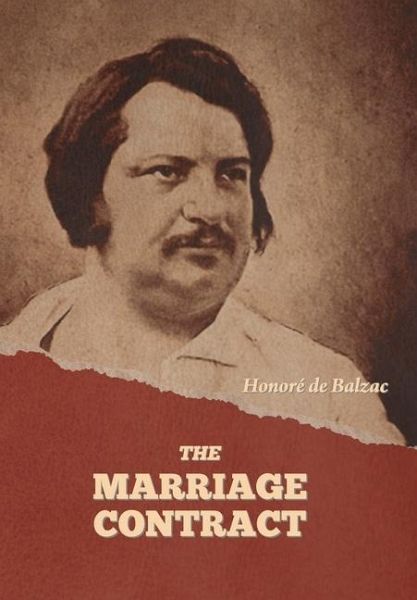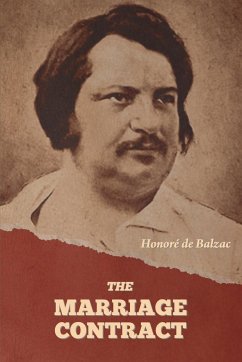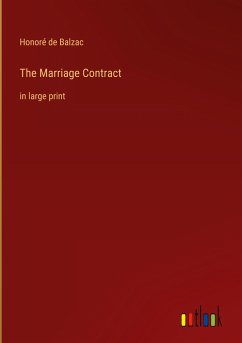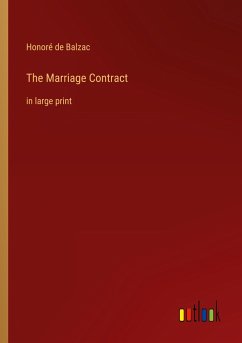
The Marriage Contract
Versandkostenfrei!
Versandfertig in über 4 Wochen
25,99 €
inkl. MwSt.

PAYBACK Punkte
13 °P sammeln!
Le Contrat de mariage (English: A Marriage Contract or A Marriage Settlement) is an 1835 novel by French author Honoré de Balzac (1799-1850) and included in the Scènes de la vie privée section of his novel sequence La Comédie humaine. Set in Bordeaux, it describes the marriage of a Parisian gentleman, Paul de Manerville, to the beautiful but spoiled Spanish heiress, Natalie Evangelista. Paul de Manerville is a gentleman born of wealth and nobility who decides, over the objections of his worldly friend de Marsay, to give up his elegant bachelor's life and get married at the age of twenty-se...
Le Contrat de mariage (English: A Marriage Contract or A Marriage Settlement) is an 1835 novel by French author Honoré de Balzac (1799-1850) and included in the Scènes de la vie privée section of his novel sequence La Comédie humaine. Set in Bordeaux, it describes the marriage of a Parisian gentleman, Paul de Manerville, to the beautiful but spoiled Spanish heiress, Natalie Evangelista. Paul de Manerville is a gentleman born of wealth and nobility who decides, over the objections of his worldly friend de Marsay, to give up his elegant bachelor's life and get married at the age of twenty-seven. He falls in love with a beautiful girl named Natalie Evangelista, the daughter of a proud Spanish matriarch whose financial assets have been diminishing since the death of her husband. Too naïve and full of illusions to see the hidden motives of Natalie Evangelista's mother, who wants Paul's wealth in order to procure for her daughter the lavish lifestyle she believes to be her birthright, or to recognize that his bride's loyalty is entirely with her mother and not with him, Paul gets himself stuck in a frigid and childless marriage. So strong are his illusions, that even at the end of the novel he remains unaware of his wife's infidelities. A Marriage Contract is one of Balzac's great studies of human illusions, in this case the illusions of married life. Paul is a subtly conveyed example of the husband, "the voluntary dupe" who prefers "to suffer rather than complain." The novel is notable for treating not only the courtship leading up to the marriage, but the negotiations which follow. A Marriage Contract also has one of Balzac's classic dissections of the techniques and wiles of professional negotiators. (wikipedia.org) About the author: Honoré de Balzac born Honoré Balzac; (20 May 1799 - 18 August 1850) was a French novelist and playwright. The novel sequence La Comédie humaine, which presents a panorama of post-Napoleonic French life, is generally viewed as his magnum opus. Owing to his keen observation of detail and unfiltered representation of society, Balzac is regarded as one of the founders of realism in European literature. He is renowned for his multi-faceted characters; even his lesser characters are complex, morally ambiguous and fully human. Inanimate objects are imbued with character as well; the city of Paris, a backdrop for much of his writing, takes on many human qualities. His writing influenced many famous writers, including the novelists Émile Zola, Charles Dickens, Marcel Proust, Gustave Flaubert, and Henry James, and filmmakers François Truffaut and Jacques Rivette. Many of Balzac's works have been made into films and continue to inspire other writers. James called him "really the father of us all." An enthusiastic reader and independent thinker as a child, Balzac had trouble adapting to the teaching style of his grammar school. His willful nature caused trouble throughout his life and frustrated his ambitions to succeed in the world of business. When he finished school, Balzac was apprenticed in a law office, but he turned his back on the study of law after wearying of its inhumanity and banal routine. Before and during his career as a writer, he attempted to be a publisher, printer, businessman, critic, and politician; he failed in all of these efforts. La Comédie Humaine reflects his real-life difficulties, and includes scenes from his own experience. Balzac suffered from health problems throughout his life, possibly owing to his intense writing schedule. His relationship with his family was often strained by financial and personal drama, and he lost more than one friend over critical reviews. In 1850, Balzac married Ewelina Hańska (née Contessa Rzewuska), a Polish aristocrat and his longtime love. He died in Paris six months later. (wikipedia.org)











